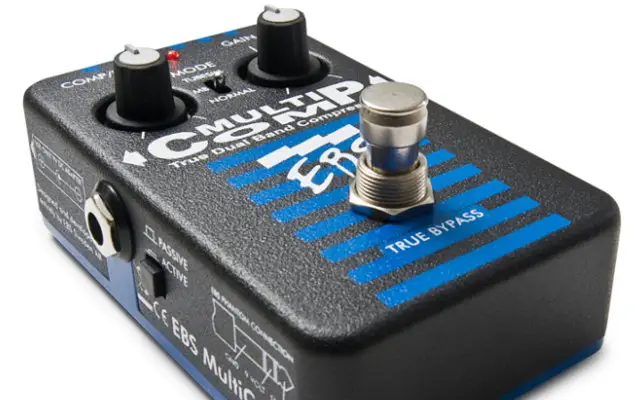Most bass players have heard of compressor pedals, but not many really know what they do for your bass tone. Bass compressors come in several different forms, but all serve the same basic function. Whether it’s a cheap stomp-box compressor or a fancy high-end rack-mounted version, the idea is essentially the same: to compress your bass signal’s dynamic range. And if you’re still asking, “Yeah, but what does a bass compressor pedal do?” then read on.
Why does a bass guitar need compression?
The bass guitar has a very wide sonic footprint that can be hard to control when mixing that signal with other instruments. That just means that the dynamic range of a bass guitar is pretty large. This is especially true when compared with other instruments in a band. A compressor can help control the sound more easily by limiting, or compressing, the range of that signal.
In other words, compression can even things out by making the louder parts quieter and at the same time making the quieter notes a bit louder, balancing the overall sound of the bass guitar. This makes it much easier to mix the bass with other instruments without losing the powerful low end that the bass produces.
Tone, not just volume
But, it isn’t just about volume. Since the bass guitar has such a wide dynamic range, you can find yourself in situations where the low end is just fine and as you attack those high end notes the amplifiers (whether you’re on a PA system, a home amp, or headphones) begin to distort and produce a tone you don’t want. It isn’t just about how loud those notes are. You’re looking for clean, clear sounds as well as proper volume.
It’s all about consistency and control…mostly
What you’re really trying to do with a bass compressor pedal is control the consistency of your sound, whether you’re playing alone or with a band. While compressors do affect your overall tone, you’ll probably be shaping your bass guitar tone a lot more with the help of dynamic effects pedals rather than a compressor.
As more and more musicians are recording at home on their computers, compressors become more and more important again. The good thing is that there are a ton of options when it comes to bass guitar compressor pedals. So, you’re bound to find exactly what you need for your sound and your budget.
Tube amp compression
This is one reason why so many bass players love tube amps. They have a natural compression effect that increases the harder you push the tubes. In fact, all of the early compressors used in studios were tube-powered models. That great Motown bass sound that we all love so much is not from an old Ampeg B-15. It’s actually from an old tube compressor plugged
Do I really need a bass compressor?
Compression is almost always used on bass to some degree in the studio; however, in live situations, it’s not quite as common. Some bassists like to use it live because it can make your tone sound fatter and punchier while adding sustain. This can help your bass stand out more in the mix.
There are others, however, that do not like to use compression live because they feel it interferes with their playing dynamics and limits the bass range too much. They also don’t like that some compressors will lower the volume and even kill some of the mids from the bass tone. A good quality compressor won’t have this problem. In fact, it should add more punch to your bass sound.
Compression with different styles of bass playing
There are some specific situations where compression is especially important. If you have a playing style that produces lots of variations in volume, attack, and tone, you definitely need a compressor pedal of some kind. Bass players who play primarily reggae, dub, R&B, low-fi hip hop, and similar genres won’t need compression nearly as much as someone who plays primarily slap bass guitar. This can also be true with punk bassists, such as Mike Watt or Paul Simonon, or if you’re playing with a pick.
This doesn’t mean that you can’t improve your tone with a compressor if you aren’t playing slap bass, especially when you’re recording or playing live with others. A compressor can still be a great tool if you’re playing R&B and just want to control the range of your tone as much as possible.
The obsession with bass compressor pedals
I remember when I first heard about bass compressor pedals soon after I started playing bass. I was completely obsessed with them for several years. I’ve probably gone through at least a dozen different brands of compressor pedals from a simple, one-knob version to a complex tube-powered model with many different setting options.
A little goes a long way
The main thing I learned from using all of those compressor pedals is that a little goes a long way. Over-doing it with too much compression can squash your tone and render it lifeless. In fact, at this moment I don’t even own a compressor, although I am seriously thinking of getting one again soon. While they’re not for everyone, they are certainly very useful.
The bottom line is that for electric bass a compressor is a very valuable tool, even if you don’t use it all the time. It’s not as flashy or fun as most bass effects pedals, but in the long run, it’s far more useful. I would strongly advise that you check one out soon and see if a bass compressor pedal is for you.

